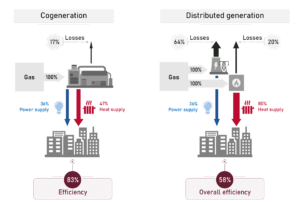U.S. Agency for International Development (USAID), through its Energy Security Project (ESP), provides technical support to the Government of Ukraine to increase the resilience of Ukraine’s energy system, continue to supply energy to the critical infrastructure and distribute heat, hot water, and sanitation services to Ukrainians despite the ongoing hostilities. While doing this, the ESP support also helps increase energy efficiency and decarbonize district heating systems.

In the interview, Diana Korsakaite, District Heating Sector Lead of USAID ESP, described the potential and benefits of using cogeneration to boost Ukraine’s district heating systems.
Having just finished the most difficult heating season in history, Ukraine is preparing for the next one. What is the USAID ESP vision of strengthening the energy system’s resilience and preparing for the next heating season?
The 2022-2023 heating season can rightly be called the most difficult one for Ukraine. The energy system built in Soviet times and based on large generation sources turned out to be vulnerable during wartime. Due to targeted shelling, the large capacity of combined heat and power (CHP) plants and thermal power plants (TPPs) was destroyed. Many power generation facilities were damaged or demolished; high-capacity transformer substations were broken; and Ukraine suffered colossal interruptions in power supply and, as a result, heat supply in almost every city in Ukraine.
Thanks to the “invisible” efforts of utility workers and the unpredictable, significant expenses of district heating companies (DHC), as many DHCs had to empty the heat supply systems and refill them several times during the heating season, limitations to heat supply were relatively minimal. Under such conditions, local authorities and DHCs were forced to use generators to provide energy in emergencies. However, the past winter has shown that this is not the most effective nor the cheapest solution. A comprehensive approach is needed to ensure the sustainability of heat supply to boiler houses, strengthen local communities’ energy security, and increase heat supply systems’ energy efficiency.
 Does the use of cogeneration units (CGUs)s increase the energy system’s resilience and ensure heat supply under conditions of constant shelling of the energy infrastructure?
Does the use of cogeneration units (CGUs)s increase the energy system’s resilience and ensure heat supply under conditions of constant shelling of the energy infrastructure?
Our analysis demonstrated that during martial law, using CGUs to simultaneously generate electricity and heat energy within the limits of one technological cycle has several advantages.
First, CGUs, especially when installed in district heating facilities, provide the DHC with its energy, thus reducing power interruptions during emergencies and supplying power to critical local infrastructure, such as water supply and sanitation systems, hospitals, etc. Secondly, with the help of CGUs, it is possible to increase the capacity to balance the energy system of Ukraine and develop efficient district heating systems to achieve energy efficiency indicators following Directive 2012/27/EU and the Law of Ukraine “On Energy Efficiency” and play an important role in balancing the energy system during the green transition. Thirdly, CGUs have a set of technical solutions that allows using reserve fuel and local energy resources in an emergency. At the same time, the cost of produced electricity is lower than that generated by a diesel generator, and the service life of the CGU is much longer. Therefore, the use of cogeneration can help not only provide heat to Ukrainian municipalities but also contribute to decarbonization and energy efficiency.
 What’s the benefit of using small and medium cogeneration in district heating systems in Ukrainian communities?
What’s the benefit of using small and medium cogeneration in district heating systems in Ukrainian communities?
Some cities in Ukraine already have the experience of using CGUs during power outages at the local level. During the last heating season, it helped them keep critical infrastructure facilities in working condition. In the next heating season, the lessons learned from using CGUs can be disseminated in many cities of Ukraine with existing district heating systems.
Technically, there are at least two ways of transmitting electricity from CGU to critical infrastructure facilities: direct powering through a separate power cable and creating a local “island mode” using networks of the Distribution System Operator (DSO). The implementation of one of these options, or a combination of both, creates opportunities for the energy supply of DH facilities from CGU and ensures the resilience of the district heating system during power outages, as well as reduces the consumption of fuel to produce heat and electricity for DHC’s own needs. Currently, CGUs are practically not used for power supply to other critical infrastructure facilities, although it is necessary. Using CGUs will increase resilience and ensure uninterrupted operations of critical municipal facilities, including water supply networks, hospitals, etc.
What changes are needed to adopt the use of small and medium CGUs?
Adopting CGUs requires improving the regulatory framework: you have to connect CGUs to their own DH facilities, regulate the energy transmission process to other local critical infrastructure facilities, and introduce a unified system of licensing and setting tariffs for heat energy. The different costs of gas to produce heat and electricity at CGU and the dependence of the gas price on political decisions in the short term are factors that do not make cogeneration attractive for investment.
It is also essential to identify the principles of cooperation between the distribution system operator (DSO), district heating company, and local authorities to create an “island mode” to ensure energy supply for critical infrastructure from CGU during blackouts. Currently, direct powering of other critical infrastructure facilities from CGU during crises is not foreseen. Some principles of incentive-based state regulation of cogeneration in Ukraine are laid down in legislation. Qualified CGUs have a lower fiscal burden than other electricity generators. In the long term, the certification of the origin of electricity from CGU will make the Ukrainian producers (of goods that use electricity from cogeneration) more competitive in the EU markets.
It is also important to envisage the use of cogeneration to increase the resilience of DH systems and as a source of backup energy supply for critical infrastructure facilities in the Methodology for the Development of Heat Supply Schemes for Residential Settlements, as well as in drafting the Methodology for Development of Local Energy Plans and Regional Energy Efficiency Programs.
What are the advantages of cogeneration as opposed to conventional gas generation? Why do you think it is more effective?
Large energy-generating facilities became targets for russian missile attacks. Therefore, small and medium cogeneration units installed at heating facilities throughout Ukraine can help heat supply systems and critical infrastructure facilities at the local level overcome power interruptions.
Speaking about the advantage of cogeneration over a conventional gas generation, cogeneration as a method of simultaneous production of electricity and heat energy within the limits of one technological process involves using one energy resource to obtain two energy products. At the same time, CGUs allow the use of different fuel types, depending on the technical solution and considering local capabilities, and provide fuel savings of up to 30% compared to conventional gas generation with the same amount of energy produced. Steam turbines and gas CGUs are most common in Ukraine. They have relatively high energy efficiency and moderate specific capital costs, although such CGUs are sensitive to the cost of gas: the higher the price of electricity generation of such CGUs, the longer the payback period of investments in their installation. Using biofuel gas CGUs with biofuel gasification technologies is a promising direction. In EU countries and worldwide, commercially available technologies on various biofuels are increasing.
